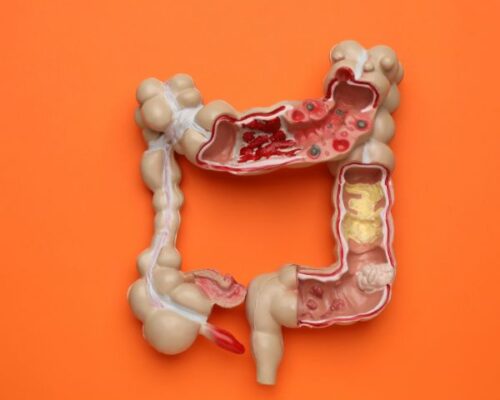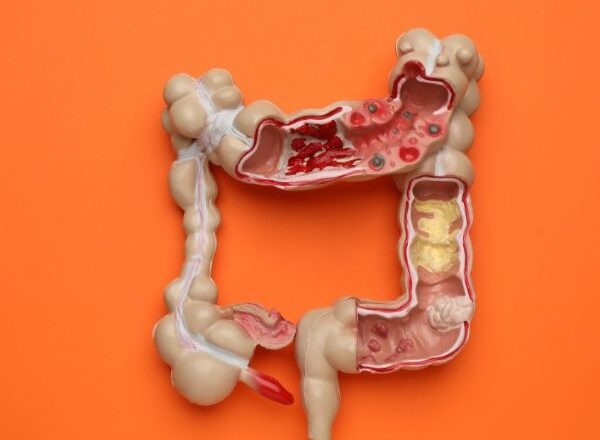Common bowel infection symptoms
Find out when bowel infection symptoms should be a cause for concern and when they may resolve on their own.
Common bowel infection symptoms
Find out when bowel infection symptoms should be a cause for concern and when they may resolve on their own.

Why are bowel infections so common?
Bowel infections are caused by a variety of factors, including contaminated food, poor hygiene, and close contact with infected individuals. These infections are widespread globally, with Australia seeing significant numbers each year. In 2024, Australia saw over 11,000 reported cases of cryptosporidiosis alone, a parasitic infection often contracted through contaminated water.
Transmission of bowel infections is typically through:
- Food contamination: Undercooked meat, contaminated water, or poorly handled food may introduce harmful bacteria or parasites.
- Poor hygiene: Not washing hands, particularly after using the restroom or before preparing food, may spread infections.
- Close contact: Being in close quarters with an infected person may potentially lead to transmission of the infection.
Recognising the symptoms early may help you avoid complications and prevent the spread of the infection.
Why are bowel infections so common?
Bowel infections are caused by a variety of factors, including contaminated food, poor hygiene, and close contact with infected individuals. These infections are widespread globally, with Australia seeing significant numbers each year. In 2024, Australia saw over 11,000 reported cases of cryptosporidiosis alone, a parasitic infection often contracted through contaminated water.
Transmission of bowel infections is typically through:
- Food contamination: Undercooked meat, contaminated water, or poorly handled food may introduce harmful bacteria or parasites.
- Poor hygiene: Not washing hands, particularly after using the restroom or before preparing food, may spread infections.
- Close contact: Being in close quarters with an infected person may potentially lead to transmission of the infection.
Recognising the symptoms early may help you avoid complications and prevent the spread of the infection.

Mild bowel infection symptoms that often resolve on their own
In many cases, bowel infection symptoms are mild and may be managed at home with proper hydration and rest. If the infection is viral or mild, the symptoms may resolve within a few days without medical intervention. Common symptoms include:
- Diarrhoea: Loose, frequent stools are often the first sign of an infection.
- Abdominal cramps: These occur as your body works to rid itself of the infection.
- Nausea and vomiting: These typically accompany viral infections like norovirus.
- Fatigue: As your body fights the infection, you may feel unusually tired.
Most of these symptoms may be short-lived and could even improve with rest, hydration, and a bland diet. However, if symptoms persist or worsen, it’s important to monitor your condition and seek medical advice.

Mild bowel infection symptoms that often resolve on their own
In many cases, bowel infection symptoms are mild and may be managed at home with proper hydration and rest. If the infection is viral or mild, the symptoms may resolve within a few days without medical intervention. Common symptoms include:
- Diarrhoea: Loose, frequent stools are often the first sign of an infection.
- Abdominal cramps: These occur as your body works to rid itself of the infection.
- Nausea and vomiting: These typically accompany viral infections like norovirus.
- Fatigue: As your body fights the infection, you may feel unusually tired.
Most of these symptoms may be short-lived and could even improve with rest, hydration, and a bland diet. However, if symptoms persist or worsen, it’s important to monitor your condition and seek medical advice.


More serious symptoms requiring attention
While many bowel infections resolve without complication, certain signs may indicate a more serious condition. If you experience any of the following, it’s important to consult with a healthcare professional:
- Persistent or severe abdominal pain: Especially if it intensifies with movement.
- High fever: This may indicate a bacterial infection or other complications.
- Blood in stool: This could be a sign of a bacterial infection like Salmonella.
- Dehydration: Symptoms such as dry mouth, dizziness, or reduced urination.
These symptoms may suggest the need for medical treatment, particularly if they persist or worsen over time.
More serious symptoms requiring attention
While many bowel infections resolve without complication, certain signs may indicate a more serious condition. If you experience any of the following, it’s important to consult with a healthcare professional:
- Persistent or severe abdominal pain: Especially if it intensifies with movement.
- High fever: This may indicate a bacterial infection or other complications.
- Blood in stool: This could be a sign of a bacterial infection like Salmonella.
- Dehydration: Symptoms such as dry mouth, dizziness, or reduced urination.
These symptoms may suggest the need for medical treatment, particularly if they persist or worsen over time.

Common causes of bowel infections
Several types of bowel infections may cause symptoms ranging from mild to severe. These infections could be contracted through contaminated food, water, or person-to-person contact. The most common causes include:
- Viral gastroenteritis (stomach flu): Caused by norovirus or rotavirus, leading to symptoms like diarrhoea, vomiting, and stomach cramps.
- Bacterial infections: Bacteria like E. coli, are often spread through contaminated food and water, causing severe diarrhoea and abdominal pain.
- Parasitic infections: Infections like Giardia may cause prolonged diarrhoea and stomach cramps, often contracted through contaminated water.
Campylobacter is one of the most common bacterial causes of gastroenteritis in Australia, leading to severe gastrointestinal symptoms in many individuals each year.
Understanding the type of infection is crucial for appropriate treatment and management.

Common causes of bowel infections
Several types of bowel infections may cause symptoms ranging from mild to severe. These infections could be contracted through contaminated food, water, or person-to-person contact. The most common causes include:
- Viral gastroenteritis (stomach flu): Caused by norovirus or rotavirus, leading to symptoms like diarrhoea, vomiting, and stomach cramps.
- Bacterial infections: Bacteria like E. coli, are often spread through contaminated food and water, causing severe diarrhoea and abdominal pain.
- Parasitic infections: Infections like Giardia may cause prolonged diarrhoea and stomach cramps, often contracted through contaminated water.
Campylobacter is one of the most common bacterial causes of gastroenteritis in Australia, leading to severe gastrointestinal symptoms in many individuals each year.
Understanding the type of infection is crucial for appropriate treatment and management.


When to seek medical help for bowel infection symptoms
Although many bowel infections resolve on their own, there are situations where medical intervention may be necessary. Seek medical help if you experience:
- Severe or persistent diarrhoea: Diarrhoea that lasts for more than three days may lead to dehydration and should be evaluated.
- Inability to keep fluids down: This is particularly concerning for infants, the elderly, and individuals with weak immune systems.
- High fever or chills: These symptoms may indicate that the infection has spread to other parts of the body or become more serious.
- Signs of complications: Such as visible amounts of blood in your stool or severe abdominal pain that doesn’t improve with rest.
If you are concerned about your symptoms or unsure about whether medical treatment is needed, it’s always best to consult with a healthcare provider for guidance.
When to seek medical help for bowel infection symptoms
Although many bowel infections resolve on their own, there are situations where medical intervention may be necessary. Seek medical help if you experience:
- Severe or persistent diarrhoea: Diarrhoea that lasts for more than three days may lead to dehydration and should be evaluated.
- Inability to keep fluids down: This is particularly concerning for infants, the elderly, and individuals with weak immune systems.
- High fever or chills: These symptoms may indicate that the infection has spread to other parts of the body or become more serious.
- Signs of complications: Such as visible amounts of blood in your stool or severe abdominal pain that doesn’t improve with rest.
If you are concerned about your symptoms or unsure about whether medical treatment is needed, it’s always best to consult with a healthcare provider for guidance.

Prioritise your health today
If you’re dealing with ongoing symptoms like diarrhoea, cramps, or dehydration, it might be time to speak with a medical professional. Identifying the underlying cause of your bowel infection may help ensure proper treatment, prevent complications, and get you back to feeling your best.
Book a consultation with a reputable gastroenterologist to assess your gastrointestinal symptoms and take the necessary steps toward recovery.

Prioritise your health today
If you’re dealing with ongoing symptoms like diarrhoea, cramps, or dehydration, it might be time to speak with a medical professional. Identifying the underlying cause of your bowel infection may help ensure proper treatment, prevent complications, and get you back to feeling your best.
Book a consultation with a reputable gastroenterologist to assess your gastrointestinal symptoms and take the necessary steps toward recovery.

FAQs
What can I do to prevent bowel infections?
To prevent bowel infections, make sure to practice good hygiene, wash your hands regularly, cook food thoroughly, and drink clean, safe water. Avoid eating undercooked meat or food that may have been contaminated.
Can bowel infections be passed from person to person?
Yes, bowel infections may be transmitted through close contact with an infected person, especially if they don’t practice proper hand hygiene.
How long do symptoms of a bowel infection typically last?
Most mild bowel infections could resolve within a few days with rest and hydration. However, symptoms like diarrhoea and abdominal pain may last longer in some cases, depending on the type of infection.
Are there any long-term effects from bowel infections?
In most cases, bowel infections may resolve without long-term effects. However, in severe cases, or if complications like dehydration occur, medical treatment may be required. Chronic conditions like irritable bowel syndrome (IBS) may also develop in some individuals after a bowel infection.
